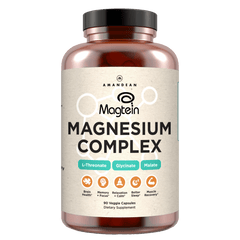Your Cart is Empty


Why Magnesium At Night Might Help You Sleep Better
Andjela Rupic
Key Takeaways:
- Supports Better Sleep Quality: Magnesium may help improve sleep by promoting relaxation and lowering stress levels.²
- Reduces Nighttime Disruptions: Including magnesium in your evening routine might help ease stress, muscle cramps, and nighttime anxiety, encouraging restorative rest.²
- Choose High-Quality Forms: For best results, opt for well-absorbed forms like magnesium glycinate, and make sure your supplement is cleanly sourced and free from unnecessary additives.*
If you’re tossing and turning at night, your body might be trying to tell you something. Enter magnesium: a powerful mineral that plays a starring role in over 300 biochemical reactions, including those tied to muscle and nerve function, blood pressure regulation, and blood sugar control.¹ While it’s easy to overlook, the benefits of taking magnesium at night can be surprisingly impactful for those looking to support deeper, more restorative rest.
At Amandean, we believe that smarter wellness routines start with clean, effective ingredients. That’s why our premium magnesium complex is formulated for optimal bioavailability – so you can give your body the support it needs, right when it needs it most.* Whether you’re chasing restful sleep, fewer muscle cramps, or more relaxing evenings, adding magnesium to your nighttime ritual might be the upgrade your routine has been missing.*
If you’re curious about all the magnesium buzz, we’re here to help. In this article, we’ll break down what it is, how it may support better sleep, the potential benefits of taking magnesium at night, and how to pick a supplement that lives up to the hype.
What Is Magnesium And Why Is It Important?
Magnesium might not have a spotlight in your supplement cabinet yet, but it should. As an essential mineral, magnesium plays a supporting role in over 300 enzymatic reactions.¹ That means it helps power everything from muscle function and nerve signaling to blood sugar balance and DNA synthesis – basically, your body’s behind-the-scenes operations rely on it.¹
The Sleep Connection
This multitasking mineral doesn’t stop working when the sun goes down. Research shows that this essential mineral may influence neurotransmitters like GABA, which supports feelings of calm and relaxation.³ These are the two main things your nervous system needs to settle into sleep mode.
Emerging research suggests magnesium may support better sleep quality.³ Current clinical studies vary widely in dosage, duration, and form, but higher-dose magnesium supplementation shows more promise than low-dose approaches in supporting sleep and stress resilience.³ Some evidence also suggests that pairing magnesium with vitamin B6, a nutrient involved in neurotransmitter production, may offer added benefits.³
It’s worth noting that many studies rely on magnesium oxide (MgO), a form with lower absorption rates.³ As future research evolves, better-absorbed forms like magnesium glycinate may prove more effective, especially for nighttime use.*
How Magnesium Supports Recovery And Relaxation
Magnesium helps with muscle recovery, blood pressure control, and moving calcium and potassium, which are key for heart and muscle health. Our formula uses magnesium malate, especially for easing muscle cramps. It’s super helpful after workouts, long days, or high stress. Low magnesium can cause cramps, irritability, poor sleep, and slow recovery. Exchange your money for our magnesium malate supplement to support your body.¹
The Bottom Line
While more research is needed to draw firm conclusions, magnesium’s impact on the nervous system is clear.³ When taken consistently in a well-formulated supplement like Amandean’s Magnesium L-Threonate Complex with Magtein, it may offer gentle support for your body’s natural ability to relax and reset – no sheep counting required.* This triple-blend formula features highly bioavailable Magnesium L-threonate, Glycinate, and Malate to help support cognitive clarity, energy production, and general recovery.*
Potential Benefits Of Taking Magnesium At Night
Let’s get to the good stuff. Why do so many wellness aficionados swear by their nightly magnesium ritual? Here’s a breakdown of how it works its evening magic:
- Promotes Relaxation Through Neurotransmitter Support: Magnesium could regulate neurotransmitters like GABA, which is known for its calming effect on the brain.⁴ By supporting GABA activity and melatonin synthesis, magnesium may help prepare the body for restful sleep.⁴
- May Help You Fall Asleep Faster: Magnesium also affects the body’s natural melatonin production.⁴ It’s a required cofactor in converting serotonin into melatonin, the hormone that helps regulate your sleep-wake cycle.⁴ When taken consistently, magnesium may support a smoother transition into sleep by helping the brain recognize when it’s time to wind down.⁴
- Supports Deeper, More Restorative Sleep: Magnesium L-Threonate significantly improved deep sleep and REM sleep scores compared to a placebo in a randomized study.⁴ That means you can experience more restorative sleep phases your brain and body rely on without overhauling your bedtime routine. Additionally, the participants in the study who took Magnesium L-Threonate reported feeling more energized, productive, and mentally alert during the day compared to the placebo group.⁴
- Could Reduce Nighttime Muscle Cramps And Tension: One of the early signs of inadequate magnesium is – you guessed it – muscle cramps and spasms.¹ Since magnesium helps regulate mineral balance and muscle contractions, ensuring consistent intake may help keep nighttime leg cramps or post-workout tightness at bay.¹
- Helps Regulate Stress And Cortisol Levels: Emerging research suggests that magnesium supports the body’s natural stress response.³ Magnesium depletion has been linked to an overactive hypothalamic-pituitary-adrenal (HPA) axis, which regulates cortisol and other stress hormones.³ Maintaining healthy magnesium levels may help promote a more balanced response to everyday stressors and support relaxation, especially as part of a consistent wellness routine.³
How To Choose The Right Magnesium Supplement
So you’re convinced that magnesium could be your ticket to Dreamland. But we get it: Most of us are too busy to research hundreds of listings online or spend hours in the supplement aisle. To help you out, we’ve broken down what you should look for into three easy categories. Finding the right magnesium product comes down to quality, bioavailability, and trust in the brand behind the bottle.
Prioritize Bioavailable Forms
When it comes to magnesium, form matters. Amandean’s Magnesium L-Threonate Complex features three highly bioavailable forms: Magnesium L-Threonate (Magtein®), Magnesium Glycinate (Bisglycinate Chelate), and Magnesium Malate (DiMagnesium Malate). These forms are carefully chosen to help support cognitive function, general stress management, muscle recovery, and sleep quality.* Unlike magnesium oxide (often poorly absorbed and primarily used as a laxative), these forms are designed for optimal absorption and effectiveness in the body.¹,³*
The Quality Inside
Our proprietary Magnesium Complex blend contains 270 mg of Elemental Magnesium per serving (3 veggie capsules). Every ingredient serves a clear purpose: no filler, additives, or questionable extras. The formula is vegan, non-GMO, and made with just five clean components – Magtein® Magnesium L-Threonate (1000 mg), Magnesium Bisglycinate Chelate (671 mg), DiMagnesium Malate (669 mg), a pharmaceutical-grade veggie capsule (HPMC), and organic rice extract blend.
Easy To Use, Easy To Trust
Amandean's commitment to purity, transparency, and science-backed sourcing makes it easy to feel good about what you're putting in your body. And just as important as what’s inside is what’s not.
The best part is it’s super simple to use. Two capsules during the day and one in the evening (about an hour before bed) to make this routine-friendly blend part of your wind-down ritual. No complicated rituals or prep required. Just clean support for your daily wellness goals.*
Final Thoughts
Magnesium is a foundational nutrient that may support your body’s ability to relax, reset, and recover after a long day.¹* From encouraging calm in the nervous system to supporting deep, restorative rest, the potential benefits of taking magnesium at night are backed by evidence and celebrated by wellness enthusiasts.³⁻⁴*
At Amandean, we’re serious about sourcing – and just as serious about sleep. Our Magnesium L-Threonate Complex is crafted with three highly bioavailable forms of magnesium and zero unnecessary extras. This is all part of our dedication to bringing you only the finest ingredients nature offers.
Ready to make magnesium a part of your nightly routine? Your future self will be glad you did.
Read also:
- Magnesium vs. Melatonin For Better Sleep
- What Are The Benefits Of Taking Collagen At Night?
- Magnesium A-Z: Everything You Need To Know
Frequently Asked Questions About The Benefits Of Taking Magnesium At Night
How do I know if I'm magnesium deficient and need it for better sleep?
Your body’s pretty good at dropping hints. Muscle cramps, low energy, difficulty falling asleep, restlessness, and general irritability may suggest your magnesium intake could use a boost.¹ Magnesium status is tricky to assess since most of it lives inside your cells, not your bloodstream. A quick check-in with your healthcare provider (possibly including a blood test) can help determine if supplementation makes sense.
What's the difference between magnesium citrate and magnesium glycinate for sleep?
Both magnesium citrate and magnesium glycinate can help with sleep, but they work differently. Magnesium citrate is great for digestion because it can act as a laxative, which might not be best right before bed. Magnesium glycinate is gentler on your stomach and pairs magnesium with glycine, an amino acid that calms your brain, reduces stress, and helps you relax for better sleep. This makes glycinate a top pick for nighttime calm.⁵
Is it okay to use magnesium in combination with other natural sleep aids?
In most cases, yes. For the average healthy adult, magnesium may work well with calming ingredients like melatonin, valerian root, and chamomile. But if you’re already taking medication or other supplements, it’s always a good idea to check with your healthcare provider first. Think of it as doing your homework beforehand.
Can children take magnesium for sleep issues?
Possibly, but it should always be under the guidance of a pediatrician. Magnesium is important for all ages, but dosing for children varies, and sleep challenges in kids can stem from many factors. Talk to a medical professional before supplementing your child’s routine.
When is the best time to take magnesium for sleep?
About 1 to 2 hours before bedtime is usually the sweet spot. This gives your body time to absorb the mineral and ease into rest mode. Consistency matters, too – try taking it around the same time every evening as part of your wind-down ritual.
How quickly does magnesium work for sleep?
Some people notice a sense of calm within 30 to 60 minutes, while others experience more noticeable effects after several nights or weeks. Magnesium tends to work gradually, building up with consistent use. Give it time – it’s worth the wait!
Sources:
- National Institutes of Health. (2022). Magnesium. National Institutes of Health. https://ods.od.nih.gov/factsheets/Magnesium-HealthProfessional/
- Patel, V., Akimbekov, N. S., Grant, W. B., Dean, C., Fang, X., & Razzaque, M. S. (2024). Neuroprotective effects of magnesium: implications for neuroinflammation and cognitive decline. Frontiers in Endocrinology, 15. https://doi.org/10.3389/fendo.2024.1406455
- Rawji, A., Peltier, M. R., Mourtzanakis, K., Awan, S., Rana, J., Pothen, N. J., & Afzal, S. (2024). Examining the effects of supplemental magnesium on self-reported anxiety and sleep quality: A systematic review. Cureus, 16(4), e59317. https://doi.org/10.7759/cureus.59317
- Hausenblas, H. A., Lynch, T., Hooper, S., Shrestha, A., Rosendale, D., & Gu, J. (2024). Magnesium-L-threonate improves sleep quality and daytime functioning in adults with self-reported sleep problems: A randomized controlled trial. Sleep Medicine X, 8, 100121. https://doi.org/10.1016/j.sleepx.2024.100121
- Kubala, J. (2023, September 7). Magnesium malate: Benefits, side effects, and dosage. Healthline. https://www.healthline.com/nutrition/magnesium-malate
Join our mailing list.
Sign up to be the first to know about our can't-miss product drops, special VIP offers & exclusive discounts, and upcoming holiday promotions.
Magnesium L-Threonate Complex With Magtein (90 Veggie Capsules)
Amandean Magnesium L-threonate blend is made with 3 ingredients: Magnesium L-threonate (Magtein), Magnesium Glycinate, (Bisglycinate...
$31.95
Shop Now



